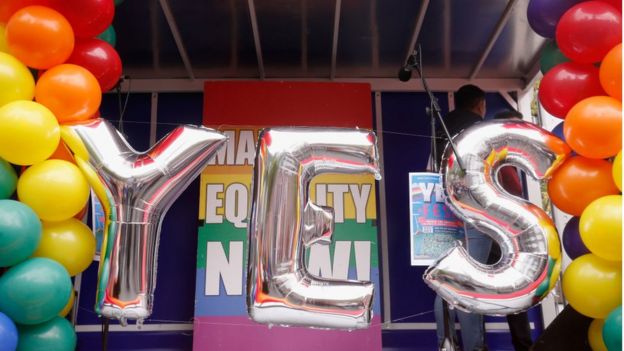
This article is more than
7 year old
The change went into effect on Monday, giving partners currently in the US until 31 December to leave, get married or otherwise change their visa.
It is a reversal of rules introduced in 2009.
Currently, 25 countries have recognised same-sex marriage. Homosexuality remains illegal in 71 countries.
The new Trump administration policy update was circulated in a United Nations (UN) memo.
The memo states: "As of 1 October 2018, same-sex domestic partners accompanying or seeking to join newly arrived United Nations officials must provide proof of marriage to be eligible for a G-4 visa or to seek a change into such status."
G-4 visas are granted to employees of international organisations and their immediate families.
According to the State Department, "only a relationship legally considered to be a marriage in the jurisdiction where it took place establishes eligibility as a spouse for immigration purposes".

In a 12 July note to the UN, the US Mission to the UN lauded the change as a step towards equality, saying "same-sex spouses of US diplomats now enjoy the same rights and benefits as opposite-sex spouses", US media report.
But critics have called the move unfair to homosexual partners, given a large number of countries do not recognise same-sex marriage.
Former US Ambassador to the UN Samantha Power decried the policy, calling it "needlessly cruel and bigoted".
Needlessly cruel & bigoted: State Dept. will no longer let same-sex domestic partners of UN employees get visas unless they are married. But only 12% of UN member states allow same-sex marriage. https://t.co/MjZpRVLYcf
— Samantha Power (@SamanthaJPower) September 28, 2018
The UN-GLOBE, advocates for LGBT equality in the UN, said the Trump administration's new policy was "an unfortunate change in rules".
"Couples already inside of the United States could go to city hall and get married. But they could potentially be exposed to prosecution if they return to a country that criminalises homosexuality or same-sex marriages."
After the end of this year, unmarried same-sex partners of diplomats and UN employees will be expected to leave the US within 30 days if they remain unmarried and without a visa status change.
The only exception, however, would be same-sex partners of officials coming from countries that do not recognise same-sex marriage. They will be granted a diplomatic visa if the government which sends them to work in their embassies in the US grants the same privileges to same-sex partners of US officials sent to that country.
The new policy is a reversal of then-Secretary of State Hillary Clinton's 2009 decision to allow same-sex domestic partners of foreign officials diplomatic visas.
According to Foreign Policy Magazine, there are at least 10 UN employees in the US with same-sex domestic partners who will need to be married by next year in order to maintain their partner's visa./>
Akshaya Kumar, the Deputy UN Director of Human Rights Watch, wrote that the change "will have an insidious impact on same-sex couples".
"The US government should recognise, as it had for almost nine years until today, that requiring a marriage as proof of bona fide partnership is a bad and cruel policy, one that replicates the terrible discrimination many LGBT people face in their own countries, and should be immediately reversed."
There are currently 71 countries that criminalise same-sex relations, according to the International Lesbian, Gay, Bisexual, Trans and Intersex Association (ILGA).
Several others have some form of legal restriction, and same-sex relationships can carry the death penalty in Iran, Saudi Arabia, Yemen, Sudan, Somalia, and Nigeria.